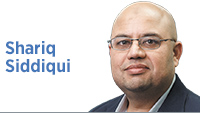Subscriber Benefit
As a subscriber you can listen to articles at work, in the car, or while you work out. Subscribe Now A recent study, Giving USA 2024, which is written and researched by Indiana University Lilly Family School of Philanthropy in partnership with Giving USA Foundation, shows a decline in giving in the past year. It also suggests that giving to houses of worship has been particularly hard hit.
A recent study, Giving USA 2024, which is written and researched by Indiana University Lilly Family School of Philanthropy in partnership with Giving USA Foundation, shows a decline in giving in the past year. It also suggests that giving to houses of worship has been particularly hard hit.
Scholars attribute many factors to this, including a decline in house of worship attendance, lower religious affiliation, decline of giving by individuals as a proportion of total giving, and the larger role that wealth plays in the giving total.
As someone who teaches and researches Muslim giving and Muslim not-for-profit institutions, I have found some additional trends I might suggest are also important reasons for the decline in giving to houses of worship. They are also potential ways in which we can work to change this trend.
First, our research on U.S. Muslim giving suggests that, while people might be giving less to houses of worship, they are giving more to other faith-based causes. For example, organizations like Islamic Relief USA, Zakat Foundation of America and other national faith-affiliated charities have shown robust growth in their funding. These organizations rely upon religious giving for their fundraising, and they have done a great job in professionalizing their organizations and fundraising approaches. They have also found ways to demonstrate greater impact and transparency, leading to greater donor trust.
Second, our research and research by the Institute for Social Policy and Understanding suggest that younger Muslim Americans are more religiously motivated. These young people, if they continue to be cultivated, are the major donors of the future. Women are similarly not being engaged effectively within mosque leadership.
Third, we are seeing evidence in which mosques that react to this decline in giving by closing their doors to external fundraising efforts are seeing a further slowdown. As compared with mosques that take greater effort to learn about their congregations’ philanthropic desires, proactively seeking out organizations that can deliver those programs and facilitating fundraising.
Finally, professionalization of mosques by business managers rather than not-for-profit or philanthropic managers might be reducing generosity in the mosque as a price of business efficiency. Arguably, increasing generosity among our congregants is a central pillar of the Islamic faith.
Mosques can do something about all of these factors. Here are some suggestions:
First, establish mission committees that survey your congregation about their social-good priorities. Then seek out partner organizations that can come to your congregation to raise funds and engage congregants in volunteering in these activities. This way, the mosque becomes a solution rather than a gatekeeper of philanthropy. Unlocking congregants’ philanthropic potential will help the mosque’s mission and also the philanthropic bottom line. Collaboration through a sense of abundance rather than scarcity will better serve mosque leaders.
Second, invest in the appropriate professionalization of mosque leaders and staff. Mosques are philanthropic institutions that require particular expertise. Hiring business managers who don’t have the expertise to balance business and mission will ultimately harm the organization’s mission and philanthropic bottom line.
Third, find ways to engage your diverse congregation. Far too often, young people, women and minorities are left out of the decision-making, forcing them to find other avenues for their valuable philanthropy.
Finally, find ways to create greater transparency and demonstrate impact. No one is perfect. Faith seeks to help us become better. By suggesting we are perfect institutions rather than honestly sharing our challenges, we are fooling no one and reducing trust.•
__________
Siddiqui is assistant professor and director of the Muslim Philanthropy Initiative at the Lilly Family School of Philanthropy at Indiana University. Send comments to [email protected].
Click here for more Forefront columns.
Please enable JavaScript to view this content.
